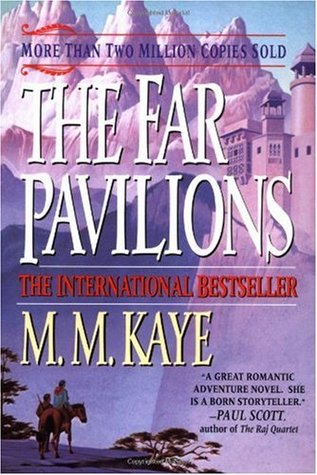 The Far Pavilions is a doorstop of a book. Massive. To the point that, when I got it from the library on my Kindle and saw it was going to take 20-some hours to read, I immediately returned it and got in hard copy instead. Why? Because even though it's a whopper of a book to haul around, it feels like I'm making more progress when I read a book in hard copy and can see the pages go by and the ones waiting diminish. Even then, it took a long while to get through this book--though that was partially because the pacing is somewhat uneven and I had to read a few other, lighter books in the meantime just to keep myself going.
The Far Pavilions is a doorstop of a book. Massive. To the point that, when I got it from the library on my Kindle and saw it was going to take 20-some hours to read, I immediately returned it and got in hard copy instead. Why? Because even though it's a whopper of a book to haul around, it feels like I'm making more progress when I read a book in hard copy and can see the pages go by and the ones waiting diminish. Even then, it took a long while to get through this book--though that was partially because the pacing is somewhat uneven and I had to read a few other, lighter books in the meantime just to keep myself going.The book follows its main character, Ash, from childhood into his mid-to-late twenties. Ash, though born to two English citizens, was raised by a Hindu woman following the death of both of his parents, and doesn't know that he's actually English until early adolescence, when he has to flee to England for fear of his life. Ultimately, he returns to India in the service of the Corps of Guides and finds himself re-enmeshed in many of the dramas that he had previously left behind, as well as some new ones. Though there is action in this book, the crux of the conflict comes from Ash's identity crisis, feeling as if he is torn between two worlds: the Indian "Ashok" work of his childhood, and the English "Ashton" world of his adulthood. All of the action ties into this to some degree.
Overall, I really liked this book. Ash, though he can be hardheaded and a jerk at times, is overall a sympathetic character. He is English by birth but was raised Indian, and has a deep-seated dislike of most of the elements of colonialism--which is kind of the opposite of what I had expected here. He also has a strong sense of fairness and right and wrong, which makes him likable--he always tries to do the right thing--but also gets him into trouble with many other characters who think in more shades of gray. This is a flaw that's admitted by Ash himself as well as several other characters in the book, showing that Kaye was clearly and keenly aware of it.
However, the pacing on this book is somewhat uneven. It's divided into eight different parts; the first had a few slow spots but were overall good, with a balance of character and action that I quite liked, and ultimately revolving around Ash being drawn to his childhood friend Juli, a princess of a small Indian kingdom. However, the last two parts, "My Brother Jonathan" and "The Land of Cain," take an abrupt turn. Instead of focusing on Ash, Kaye (for some reason) veers into the political and military shambles that was the Second Anglo-Afghan War and the ill-fated English mission that followed it. Though Ash is the main character of the rest of the book, in these two parts he's abruptly shoved aside in favor of a handful of other Corps of Guides officers who, while familiar, seem to rise to main character status out of pretty much nowhere. Ash is still involved in these conflicts, but in a very secondary role, and while the climactic events are important to his ultimate character development, it just felt strange because our main character was mostly absent.
Overall, I really enjoyed this. I think Kaye has a great sense for atmosphere and character, and clearly has a love for India of her own--though, as a quick note, this being pre-partition India, much of the action actually takes place in what we would presently think of as Pakistan. There are definite flaws here--the pacing for certain, and while I liked Ash overall, he had a few distasteful moments that made me shy away from fawning over him. But this is definitely an "epic" sort of book, and I'm definitely interested in reading the few other ones like this Kaye put forward.
4 stars out of 5.
No comments:
Post a Comment